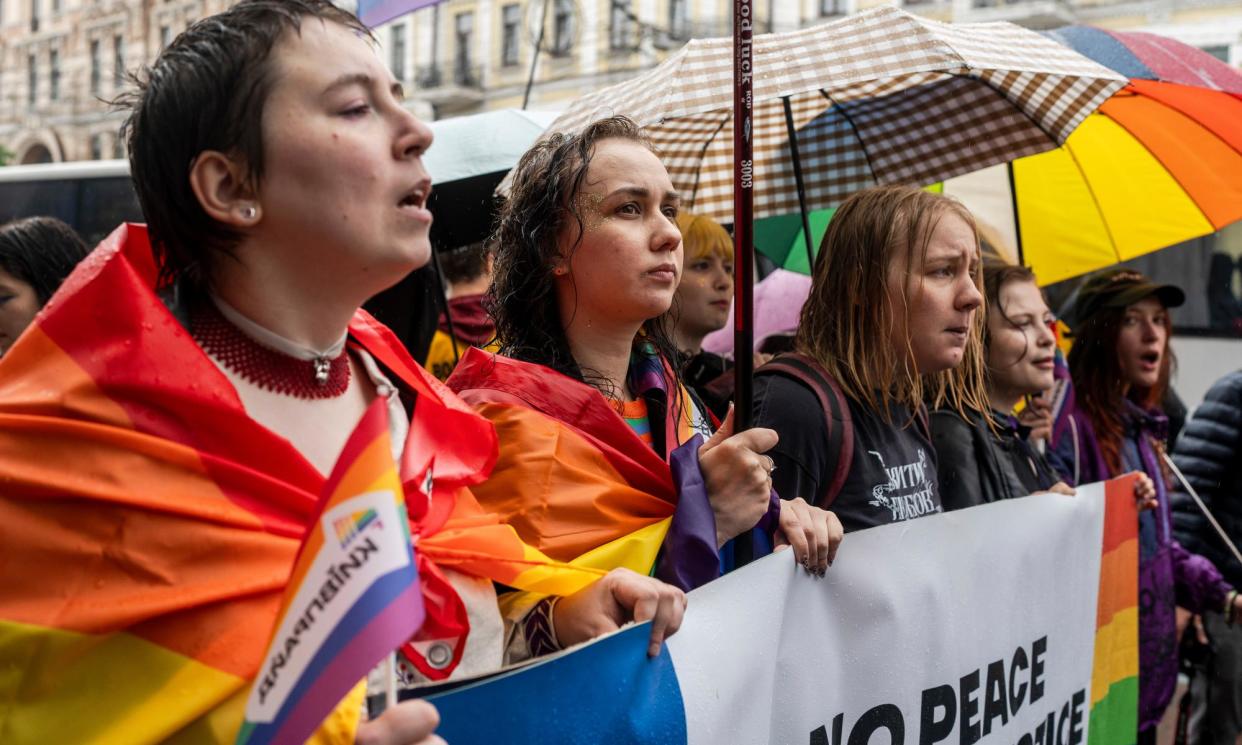First Pride march since Russian invasion takes place in Kyiv

The first Kyiv Pride march since the 2022 Russian invasion of Ukraine was stopped by police after travelling only a few metres due to safety fears.
In a display of resilience amid the conflict, several hundred people gathered in the rain at 10am local time in central Kyiv under umbrellas, waving rainbow flags and carrying banners with messages of unity and peace.
Chanting “glory to the heroes” and “make Russia pay”, protesters called for tougher legal protection in the form of a hate crime law, equal marriage rights and more weapons for the military.
The crowd was dispersed after only ten minutes, however, and redirected into the subway and on to trains by the police. One of the event’s organisers, Robert Lutsenko, said police had warned that radical, anti-LGBTQ+ groups had also organised gatherings in the city.
“We always face significant opposition and violence in our efforts to organise Pride events, many homophobes believe it should not be allowed in Ukraine for gays to have rights,” said Lutsenko. “Every day, we face homophobic opinions and protests against the way we live our lives.”
Previous Ukrainian Pride marches have been disrupted by violence. In one incident in 2015, 10 marchers and several police officers were injured in an attack by homophobic protesters.
The Kyiv Pride team said it had worked in close coordination with police and the local administration to organise the event amid the dual threat posed by conservative groups and regular Russian attacks. It was held close to a metro station for shelter in the event of an air raid warning, and with heavy police presence.
The location of the march was kept secret, and released only to approved people a few hours beforehand.
In 2023, the Ukrainian NGO the Nash Svit Center’s monitoring network recorded 52 cases of violence, discrimination and other violations of LGBTQ+ rights. Lutsenko said 10 cases were recorded this year in April and March alone, while many more are thought to go unreported.
Kyiv Pride, an NGO set up in 2012, is spearheading efforts to reform Ukraine’s laws to make hate crime and discrimination based on sexual orientation and gender identity as punishable offences.
Ukraine lacks comprehensive legislation protecting LGBTQ+ individuals from discrimination and violence. A 2020 report from Freedom House highlighted that the lack of qualified professional legal assessment of hate crimes remains a serious problem in Ukraine.
“Basic rights such as protection against hate crimes are still unreachable,” said Lutsenko. “But this Pride is a symbol of our resistance. We are here to show that we stand strong, that love and solidarity can thrive even in the darkest times.”
Protester and volunteer Yaroslav Melnyk, 26, a video editor, said he had been the victim of bullying, harassment and violence in the past due to his appearance. In 2019, he was attacked in the street and his phone smashed, because he was carrying a rainbow flag tote bag.
“We take a risk every year by coming to Pride and this year even more so due to Russian missiles,” said Melnyk. “I’m just happy we can march again, I missed it a lot. I am happy people came and it was safe.”
The last Kyiv Pride march was held in June 2021 with about 8,000 people in attendance. The event was then cancelled for two years due to Russia’s 2022 invasion. Ukrainians have, however, taken part in marches around the world, from the US to Germany, calling for both support for Ukraine and the LGBTQ+ community.
The cost of Russia’s ongoing war was ever-present at the march, with photo tributes to LGBT soldiers killed in action, including Artur Snitkus, an artist and well-known activist who was killed in combat near Donetsk this month.
Several male protesters said they also had their documents checked by police, with one volunteer handed a summons to report to the military draft office.
A key issue for the march was the lack of legal recognition for same-sex marriages, one that is particularly important to LGBTQ+ members of the military. Their partners currently have no legal rights in the event of their death or injury.
“It’s really important in the context of the war because queer people in the army and their partners don’t get leave to meet and don’t get told if something happened to them – in law they are no one to each other,” said Lutsenko. “Our soldiers, risking their lives on the frontlines, deserve rights and recognition.”
Ukraine’s lack of LGBTQ+ rights threatens to hinder its process of joining the European Union, a key target for the government amid Russian aggression. President Volodymyr Zelenskiy has faced criticism for not prioritising equal rights for LGBTQ+ soldiers, citing legal constraints in changing the constitution during wartime.
Peter Zherukha, 28, a soldier since the first few days of the war, was the author of a petition to the president over the need for a bill on same-sex marriage. It received more than 25,000 signatures. He received leave from his unit to attend the Pride march.
“What I stand for, what I fight for, is for this – it is so important to have the chance to be visible and speak up,” he said.

 Yahoo News
Yahoo News 
